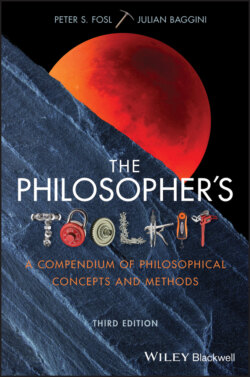| 3.1 | Affirming, denying, and conditionals |
| 4.1 | A priori/a posteriori |
| 2.1 | Abduction |
| 4.2 | Absolute/relative |
| 3.2 | Alternative explanations |
| 3.3 | Ambiguity and vagueness |
| 2.4 | Analogies |
| 4.3 | Analytic/synthetic |
| 2.5 | Anomalies and exceptions that prove the rule |
| 5.1 | Aphorism, fragment, remark |
| 1.1 | Arguments, premises, and conclusions |
| 1.9 | Axioms |
| 7.1 | Basic beliefs |
| 4.4 | Belief/knowledge |
| 3.4 | Bivalence and the excluded middle |
| 4.5 | Categorical/modal |
| 5.2 | Categories and specific differences |
| 3.5 | Category mistakes |
| 4.6 | Cause/reason |
| 1.11 | Certainty and probability |
| 3.6 | Ceteris paribus |
| 3.7 | Circularity |
| 6.1 | Class critique |
| 3.8 | Composition and division |
| 3.9 | Conceptual incoherence |
| 4.7 | Conditional/biconditional |
| 1.6 | Consistency |
| 3.10 | Contradiction/contrariety |
| 3.11 | Conversion, contraposition, obversion |
| 3.12 | Counterexamples |
| 3.13 | Criteria |
| 6.8 | Critiques of naturalism |
| 6.2 | Différance, deconstruction, and the critique of presence |
| 1.2 | Deduction |
| 4.9 | Defeasible/indefeasible |
| 1.10 | Definitions |
| 4.8 | De re/de dicto |
| 2.3 | Dialectic |
| 3.14 | Doxa/para‐doxa |
| 5.3 | Elenchus and aporia |
| 6.3 | Empiricist critique of metaphysics |
| 4.11 | Endurantism/perdurantism |
| 4.10 | Entailment/implication |
| 3.15 | Error theory |
| 4.12 | Essence/accident |
| 1.7 | Fallacies |
| 3.17 | False cause |
| 3.16 | False dichotomy |
| 6.4 | Feminist and gender critiques |
| 6.5 | Foucaultian critique of power |
| 3.18 | Genetic fallacy |
| 7.2 | Gödel and incompleteness |
| 5.4 | Hegel’s master/slave dialectic |
| 6.6 | Heideggerian critique of metaphysics |
| 7.3 | Hermeneutic circle |
| 3.19 | Horned dilemmas |
| 5.5 | Hume’s fork |
| 2.2 | Hypothetico‐deductive method |
| 5.6 | Indirect discourse |
| 1.3 | Induction |
| 4.13 | Internalism/externalism |
| 2.6 | Intuition pumps |
| 1.5 | Invalidity |
| 3.20 | Is/ought gap |
| 4.14 | Knowledge by acquaintance/description |
| 6.7 | Lacanian critique |
| 5.7 | Leibniz’s law of identity |
| 2.7 | Logical constructions |
| 3.21 | Masked man fallacy |
| 4.15 | Mind/body |
| 7.5 | Mystical experience and revelation |
| 4.16 | Necessary/contingent |
| 4.17 | Necessary/sufficient |
| 6.9 | Nietzschean critique of Christian–Platonic culture |
| 4.18 | Nothingness/being |
| 4.19 | Objective/subjective |
| 5.8 | Ockham’s razor |
| 7.6 | Paradoxes |
| 3.22 | Partners in guilt |
| 2.8 | Performativity and speech acts |
| 5.9 | Phenomenological method(s) |
| 7.4 | Philosophy and/as art |
| 7.7 | Possibility and impossibility |
| 6.10 | Pragmatist critique |
| 7.8 | Primitives |
| 3.23 | Principle of charity |
| 3.24 | Question‐begging |
| 4.20 | Realist/non‐realist |
| 2.9 | Reduction |
| 3.25 | Reductios |
| 3.26 | Redundancy |
| 1.8 | Refutation |
| 3.27 | Regresses |
| 2.10 | Representation |
| 6.11 | Sartrean critique of ‘bad faith’ |
| 3.28 | Saving the phenomena |
| 7.10 | Scepticism |
| 3.29 | Self‐defeating arguments |
| 7.9 | Self‐evident truths |
| 4.21 | Sense/reference |
| 5.10 | Signs and signifiers |
| 4.22 | Substratum/bundle |
| 3.30 | Sufficient reason |
| 4.23 | Syntax/semantics |
| 1.12 | Tautologies, self‐contradictions, and the law of non‐contradiction |
| 3.31 | Testability |
| 4.25 | Thick/thin concepts |
| 2.11 | Thought experiments |
| 5.11 | Transcendental argument |
| 4.26 | Types/tokens |
| 7.11 | Underdetermination |
| 4.24 | Universal/particular |
| 2.12 | Useful fictions |
| 1.4 | Validity and soundness |
